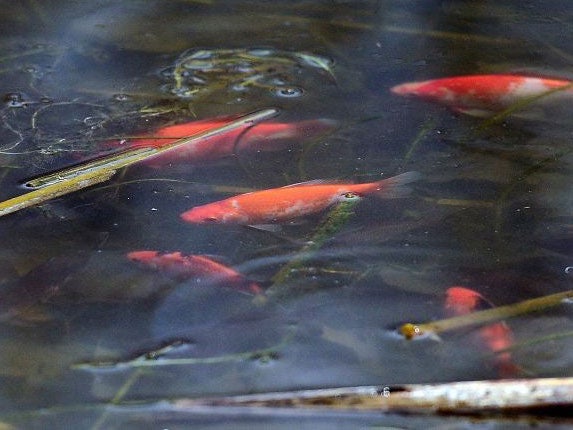Thousands of goldfish infest lake in Colorado
The gold fish are thought to have bred from only three or four that were illegally released into the lake

Your support helps us to tell the story
From reproductive rights to climate change to Big Tech, The Independent is on the ground when the story is developing. Whether it's investigating the financials of Elon Musk's pro-Trump PAC or producing our latest documentary, 'The A Word', which shines a light on the American women fighting for reproductive rights, we know how important it is to parse out the facts from the messaging.
At such a critical moment in US history, we need reporters on the ground. Your donation allows us to keep sending journalists to speak to both sides of the story.
The Independent is trusted by Americans across the entire political spectrum. And unlike many other quality news outlets, we choose not to lock Americans out of our reporting and analysis with paywalls. We believe quality journalism should be available to everyone, paid for by those who can afford it.
Your support makes all the difference.A lake in Colorado has been taken over by thousands of gold fish which threaten to ruin the natural eco-system by eating up resources and spreading unnatural disease.
Wildlife officials say the spread of the popular household pet in Teller Lake, around 14 miles east of the city of Boulder, started with someone dumping just “four of five” gold fish in the water two or three years ago.
It is estimated that the animals have now multiplied to between 3,000 and 4,000.
Jennifer Churchill, spokeswoman for Colorado Parks and Wildlife (CPW) said: “Dumping your pets into a lake could bring diseases to native animals and plants as well as out-compete them for resources.”

Speaking to ABC News, she added: “Everything can be affected. Non-native species can potentially wipe out the fishery as we’ve put it together.”
Kristin Cannon, district wildlife manager for Boulder told the network: “Gold fish are not a native species and are very harmful to the local ecosystem.
“We strongly encourage the public not to dump their unwanted pet fish in our waters. It is bad for the environment as well as illegal.”
Species control crews are now facing the strenuous task of attempting to remove the thousands of gold fish.
As it stands they are faced with two options of how to undergo this process.
The first is to drain the lake, which is a formidable 12 acres, before removing the fish. The second option is to use electrofishing, where the fish are stunned by an electrical current and removed while they are temporarily paralysed.
The second is apparently the more likely option. It was used in another lake in Colorado, Thunderbird Lake, in November 2012, to remove koi gold fish that had been introduced improperly.
Ken Kehmeier, senior aquatic biologist for CPW said: “Most people don’t realise the far-reaching effects of introducing exotic species to the environment.”
People have reportedly been asking if they can take some of the gold fish for their ponds but Boulder park officials say that they do not want people removing these gold fish, as it could disrupt the natural wildlife around the ponds.
The gold fish are likely to be given to a raptor rehabilitation programme as food for injured birds of prey after they have been removed.
Join our commenting forum
Join thought-provoking conversations, follow other Independent readers and see their replies
Comments